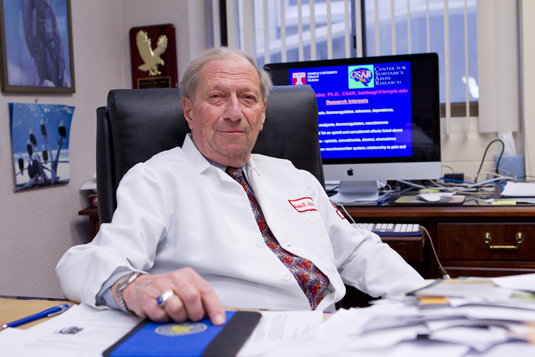Adler’s 50-year love affair with Temple continues

In 1960, Martin Adler literally could have gone anywhere, but he chose Temple.
As the first Ph.D. graduate from Albert Einstein College of Medicine, Adler had some 20 job offers in pharmacology from a variety of institutions. But after interviewing at Temple, he knew this was the place he wanted to be.
“I really liked the people, and I just had a good feeling about Temple,” said Adler, who joined the pharmacology faculty in Temple’s School of Medicine. “And I still do. It’s kept me here for 50 years.”
The Temple of a half-century ago had the same basic structure, with nearly the same number of schools and colleges, remembers Adler, who is director emeritus and senior advisor of Temple’s Center for Substance Abuse Research. “But it was a smaller institution back then, so it was more integrated,” he said. “There was more interaction between the Health Sciences Campus and Main Campus.”
So small and integrated that Adler recalls during his early days at Temple that the School of Medicine Dean — “I think I’m on about my 13th dean,” he notes — would come to the cafeteria every morning around 8:30 and faculty could talk with the dean over coffee.
But while the university has grown and changed over the years, Adler said one thing has remained a constant. “What has not changed is the emphasis on education. That’s always been the main emphasis of Temple,” he said.
A teacher and a researcher when he first came to Temple, Adler gave up full-time teaching when he became an emeritus professor 10 years ago. But he still receives grant funding and maintains a full research lab in the School of Medicine.
In his early years, his research focused primarily on the effects of brain damage from epilepsy and the brain’s response to different drugs such as morphine, which are used to treat altered brain activity and help in the recovery of brain function. Today, he continues to study such drugs, but now in terms of their impact on pain relief and the immune system.
“There have been so many changes, especially in genes and genetics,” he said. “A lot of changes have occurred in the immunology field. When I took immunology as a graduate student it wasn’t even a separate discipline.”
After a half-century, most people would be thinking about enjoying their retirement, but not Adler. He still loves the people he works with and is as motivated about his research as ever.
“One of the positive things about Temple is that the people are so great to work with — the best group of people I’ve known anywhere,” he said. “They’re good scientists, you can work with them and nobody ever turns you down if you want to work collaboratively.
“Also, I still want to do something good for society, and I think what I’m working on now may be the most exciting thing I’ve ever worked on,” he said. “Because if this works — always a big if — we can have a whole brand new approach to treating severe inflammatory pain.”
So how much longer will he continue in his lab?
“Research is a way of life and it is my life,” said Adler. “Nothing gives me more aggravation than some of the things that go on in my research, but nothing gives me greater pleasure and satisfaction. So, I’ll go on as long I keep getting grant funding.”